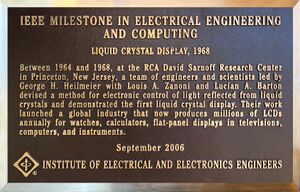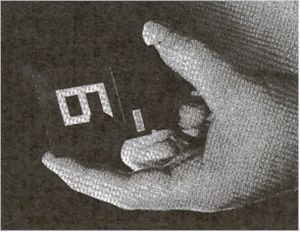Milestones:Liquid Crystal Display, 1968: Difference between revisions
No edit summary |
No edit summary |
||
| (21 intermediate revisions by 7 users not shown) | |||
| Line 1: | Line 1: | ||
== Liquid-Crystal Display, 1968 | {{Milestone box | ||
|Date Dedicated=2006/09/30 | |||
|Dedication=71 | |||
|Location=Princeton, NJ, U.S.A. | |||
|IEEE Regions=1 | |||
|IEEE sections=Princeton/Central Jersey | |||
|Summary=David Sarnoff Library, 201 Washington Road, Princeton, New Jersey, U.S.A. Dedication: 30 September 06. Between 1964 and 1968, at the RCA David Sarnoff Research Center in Princeton, New Jersey, a team of engineers and scientists led by George H. Heilmeier with Louis A. Zanoni and Lucian A. Barton, devised a method for electronic control of light reflected from liquid crystals and demonstrated the first liquid crystal display. Their work launched a global industry that now produces millions of LCDs annually for watches, calculators, flat-panel displays in televisions, computers and instruments. | |||
|Abstract=Between 1964 and 1968, at the RCA David Sarnoff Research Center in Princeton, New Jersey, a team of engineers and scientists led by George H. Heilmeier with Louis A. Zanoni and Lucian A. Barton, devised a method for electronic control of light reflected from liquid crystals and demonstrated the first liquid crystal display. Their work launched a global industry that now produces millions of LCDs annually for watches, calculators, flat-panel displays in televisions, computers and instruments. | |||
|Special citation=No | |||
}} | |||
== Liquid-Crystal Display, 1968 == | |||
[[image:LCD-Plaque.jpg|thumb]] | |||
[[Image:Liquid Crystal Display.jpg|thumb]] | |||
[[ | ''Between 1964 and 1968, at the RCA David Sarnoff Research Center in Princeton, New Jersey, a team of engineers and scientists led by [[George H. Heilmeier|George H. Heilmeier]] with Louis A. Zanoni and Lucian A. Barton, devised a method for electronic control of light reflected from liquid crystals and demonstrated the first liquid crystal display. Their work launched a global industry that now produces millions of LCDs annually for watches, calculators, flat-panel displays in televisions, computers and instruments''. | ||
'''The plaque can be viewed at SRI International, 201 Washington Road, Princeton, NJ 08540 USA; GPS: 40.33146, -74.63136. The plaque is one of three that are mounted on the left and right pillars adjoining the entrance doors to the Visitors Lobby. This facility was formerly the David Sarnoff Research Center and later Sarnoff Corp.''' | |||
For those interested in learning more about the history of liquid crystals, we recommend the following article from ''Proceedings of the IEEE''. "The History of Liquid Crystal Displays", Hirohisa Kawamoto, [[IEEE Fellow Grade History|Fellow]], IEEE, Vol. 90, No. 4, April 2002 Copyright IEEE | |||
== Further Reading == | |||
[[First-Hand:Liquid Crystal Display Evolution - Swiss Contributions|Liquid Crystal Display Evolution - Swiss Contributions]] - Peter Wild's account of the Swiss contributions to the LCD | |||
{{Milestone|GeoLoc=40.331685, -74.631637|Description=David Sarnoff Library, 201 Washington Road, Princeton, New Jersey, U.S.A. Dedication: 30 September 06. Between 1964 and 1968, at the RCA David Sarnoff Research Center in Princeton, New Jersey, a team of engineers and scientists led by George H. Heilmeier with Louis A. Zanoni and Lucian A. Barton, devised a method for electronic control of light reflected from liquid crystals and demonstrated the first liquid crystal display. Their work launched a global industry that now produces millions of LCDs annually for watches, calculators, flat-panel displays in televisions, computers and instruments.}} | |||
[[Category:Computing_and_electronics]] | |||
[[Category:Image_processing]] | |||
[[Category:Information_display]] | |||
Latest revision as of 14:41, 19 December 2023
- Date Dedicated
- 2006/09/30
- Dedication #
- 71
- Location
- Princeton, NJ, U.S.A.
- IEEE Regions
- 1
- IEEE sections
- Princeton/Central Jersey
- Achievement date range
- 1968
Liquid-Crystal Display, 1968
Between 1964 and 1968, at the RCA David Sarnoff Research Center in Princeton, New Jersey, a team of engineers and scientists led by George H. Heilmeier with Louis A. Zanoni and Lucian A. Barton, devised a method for electronic control of light reflected from liquid crystals and demonstrated the first liquid crystal display. Their work launched a global industry that now produces millions of LCDs annually for watches, calculators, flat-panel displays in televisions, computers and instruments.
The plaque can be viewed at SRI International, 201 Washington Road, Princeton, NJ 08540 USA; GPS: 40.33146, -74.63136. The plaque is one of three that are mounted on the left and right pillars adjoining the entrance doors to the Visitors Lobby. This facility was formerly the David Sarnoff Research Center and later Sarnoff Corp.
For those interested in learning more about the history of liquid crystals, we recommend the following article from Proceedings of the IEEE. "The History of Liquid Crystal Displays", Hirohisa Kawamoto, Fellow, IEEE, Vol. 90, No. 4, April 2002 Copyright IEEE
Further Reading
Liquid Crystal Display Evolution - Swiss Contributions - Peter Wild's account of the Swiss contributions to the LCD

